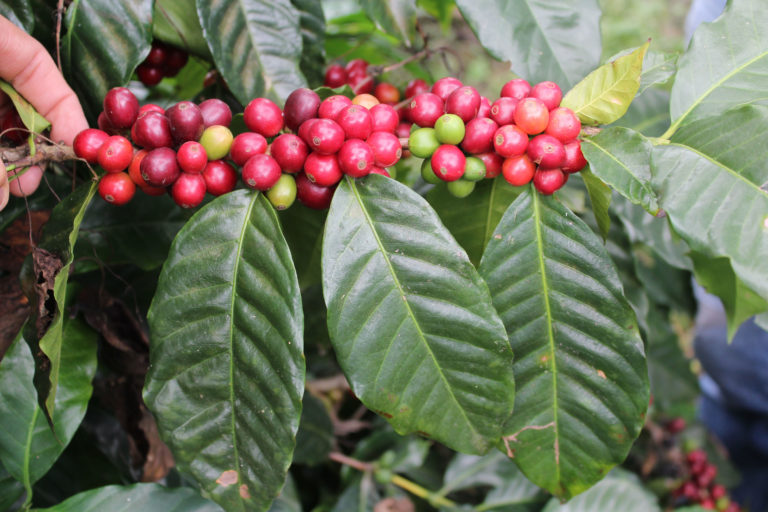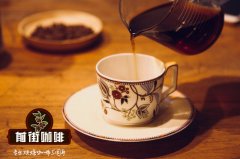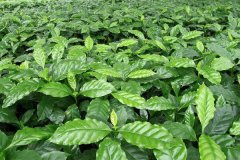Yunnan small grain coffee which tastes good _ authentic Yunnan small grain coffee where to buy better?

Professional coffee knowledge exchange More coffee bean information Please pay attention to coffee workshop (Weixin Official Accounts cafe_style)
I believe that many friends have not heard of Yunnan coffee, after all, those we often drink on the market are foreign brands, in fact, in our China is also producing coffee.
Yunnan coffee planting area, production accounted for more than 99% of the country. Yunnan's natural conditions are very similar to those of Colombia. The coffee produced in Yunnan tastes similar to that of Colombia Arabica coffee, and the overall quality is better than that of Brazilian coffee. Liang Houfu, a well-known news commentator in the United States, wrote: "The best coffee in the world is produced in Yunnan, and the coffee produced in Yunnan is very enjoyable to touch the tongue." More than 60% of the coffee beans produced each year are acquired by large companies such as Nestle, Maxwell and Wyeth, and the price is low. Due to the lack of deep processing and marketing, Yunnan coffee has a low reputation and is locked in the mountains.
So how does coffee come from?
In 1892, French missionary Father Tian successfully planted coffee in a place called Zhukula in Yunnan Province. Up to now, 24 coffee trees with more than 100 years old still grow in Zhukula Township. Zhukula is a mysterious, legendary and beautiful natural village, belonging to Zhukula Village Committee of Pingchuan Town, Binchuan County, Dali Prefecture. It is located on the bank of Yupao River, a tributary of Jinsha River. This is a place where Dali Prefecture, Chuxiong City and Lijiang City meet.
The growth period of Arabica coffee
Coffea arabica 3~4 years old fruiting trees. Coffee is a short-day plant. Coffee has the characteristics of multiple flowering and concentrated flowering. Coffea arabica flowers from February to July and blooms from March to May in Yunnan. The flowering of coffee is greatly affected by climate, especially rainfall and temperature. Coffee flower life is short, only 2 - 3 days. Arabica coffee generally opens at 3 to 5 in the morning and blooms at 5 to 7. Coffee fruits take longer to develop. Coffee arabica ripens in 8~10 months, usually in October ~ December of the year. Rainfall has a great influence on fruit development, and climate conditions directly affect fruit development.
Therefore, friends after understanding is not eager to taste, drink more other neutral coffee, change the taste from time to time is not bad ah.
product Brief of
Catimor has been widely planted in Dehong, Baoshan, Pu 'er, Xishuangbanna, Lincang, Wenshan and Yuxi in coffee planting areas of Yunnan Province.
In 1959, the Portugal moved the Brazilian bourbon mutant Kadura to East Timor and interbred it with Timtimor, which has a Robusta lineage. Unexpectedly, they succeeded in breeding Kadim, which is highly resistant to disease and highly productive. As leaf rust afflicts coffee producing countries worldwide, katim is being promoted to combat leaf rust and improve productivity with the assistance of international organizations.
approach
This bean is washed.
Screening coffee cherries--removing pulp--fermentation--washing--drying--dehulling
Kannon uses a peeling machine to separate most of the pulp from the coffee beans, and then guides the beans with shells to a clean tank, soaking them in water for fermentation to completely remove the residual pulp layer. After washing, they present obvious fruit acid and cleaner taste.
baking analysis
Baking machine Yangjia 800N (baking capacity 300g)
When the furnace temperature is 190℃, put it into the pot, fire power is 120 ℃, air door is opened 3; when the furnace temperature is 145℃, open the air door to 4, fire power is unchanged; when the furnace temperature is 166℃, the bean surface turns yellow, the grass smell disappears completely, and enters the dehydration stage. When the furnace temperature reaches 188℃, adjust the fire power to 60℃, and the air door is 5;
8 37", the bean surface appears ugly beard wrinkles and black stripes, toast flavor obviously changed to coffee fragrance, can be defined as a prelude to explosion, this time to hear the sound of a burst point, to 9 00" to start a burst, the damper unchanged, a burst after the development of 3 minutes, 198℃ pot.
Agtron Bean Color 63.1 (top), Agtron Pink 70.4 (bottom), Roast Delta 7.3.
cup test
Flavors by cup: Herbal, nutty, chocolate, caramel
1. Flavor description varies from person to person, and is affected by water temperature and brewing method. This cup test report provides the description defined by the flavor wheel under the same brewing equipment and parameters, so as to provide reference;
2. The content will be revised in time to reflect new information content, subject to the latest updates.
Hand washing suggestions
Recommended brewing method: hand brewing
Filter cup: V60
Water temperature: 90-92℃
Powder water ratio: 1:15
Grinding degree: medium fine grinding, i.e. fine granulated sugar thickness (VARIO 5O: 57% pass rate of Chinese standard No.20 sieve)
Brewing method: staged extraction. Steaming with 30g of water for 30 seconds, injecting water in a circle with small water flow to 124g, performing segmentation, continuing to inject water to 227g when the water level drops and is about to expose the powder bed, removing the filter cup when the water level drops and is about to expose the powder bed, and extracting for 2 minutes.
When brewed in a V60 filter cup, it smells very nutty, with herbs, chocolate, caramel and a hint of fruit acid in the finish.
END
Important Notice :
前街咖啡 FrontStreet Coffee has moved to new addredd:
FrontStreet Coffee Address: 315,Donghua East Road,GuangZhou
Tel:020 38364473
- Prev

Silent coffee shop, praise these great people
Professional coffee knowledge exchange More coffee bean information Please pay attention to Coffee Workshop (Weixin Official Accounts cafe_style) There is a special coffee shop with 23 employees, 13 of whom are hearing impaired baristas. On the eve of the International Day of the Deaf on September 22, the coffee shop was awarded a plaque for a demonstration base for disabled integration jobs, which Yuexiu District Disabled Persons 'Federation hopes to drive
- Next

How does Yunnan small grain coffee taste? how many flavors does Yunnan small grain coffee have?
Professional coffee knowledge exchange more coffee bean information please follow the coffee workshop (Wechat official account cafe_style) Yunnan coffee cultivation and output accounts for 98% of the country, Yunnan coffee in the end what is good? Yunnan is the main coffee producing place in China, and more than 90% of the coffee in China is produced here. Baoshan, Lincang, Pu'er and Dehong are the main coffee producing areas in our province.
Related
- Beginners will see the "Coffee pull flower" guide!
- What is the difference between ice blog purified milk and ordinary milk coffee?
- Why is the Philippines the largest producer of crops in Liberia?
- For coffee extraction, should the fine powder be retained?
- How does extracted espresso fill pressed powder? How much strength does it take to press the powder?
- How to make jasmine cold extract coffee? Is the jasmine + latte good?
- Will this little toy really make the coffee taste better? How does Lily Drip affect coffee extraction?
- Will the action of slapping the filter cup also affect coffee extraction?
- What's the difference between powder-to-water ratio and powder-to-liquid ratio?
- What is the Ethiopian local species? What does it have to do with Heirloom native species?

